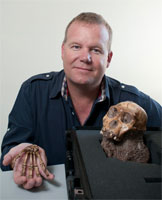
Related
Top stories






More news


Marketing & Media
Ads are coming to AI. Does that really have to be such a bad thing?














Berger's explorations into human origins in Africa over more than two decades have resulted in many significant discoveries, and he directs one of the largest paleontological projects in history, leading more than 100 scientists who are studying fossils from a rich, recently discovered site outside Joburg, called Malapa.
Explorers-in-residence are some of the world's preeminent explorers and scientists, and represent a broad range of science and exploration; they develop programmes in their respective areas of study, carrying out fieldwork supported by the society. Fellows, with guidance and support from the National Geographic Society, generate and cultivate ideas that often become substantive programmes.
"Lee Berger perfectly embodies the new age of exploration that the National Geographic Society is celebrating in its 125th year," said Terry Garcia, executive vice-president of Mission Programs. "We're honoured to have the chance to work directly with this dynamic explorer who is a pioneer in his field."
As an explorer-in-residence, Berger will continue his work at Malapa, where he and a team have unearthed the most complete early hominin fossils yet discovered belonging to a new species of early human ancestor - Australopithecus sediba. "We'll be opening excavations again at the Malapa site and creating a virtual online laboratory where people from around the world can observe and interact with the preparation of early-human fossils," Berger said. "We'll also be developing an exploration academy to impart basic and advanced skills in exploration sciences to the next generation of explorers."
Berger is an award-winning researcher, explorer, author and speaker. He is the recipient of the National Geographic Society's first Prize for Research and Exploration, awarded in 1997, and the Academy of Achievement's Golden Plate Award, among many other achievements. His explorations into human origins in Africa, Asia and Micronesia have resulted in many new discoveries, especially A. sediba. Berger also has pioneered advances in applied exploration methods and the application of technology to exploration, excavation and discovery.
Berger is the author of more than 200 scholarly and popular papers, including more than 80 refereed publications, and several academic and popular books on paleontology, natural history and exploration. His work has appeared three times on the cover of the journal Science and has been named the top science stories of the year by Time, Scientific American and Discover magazines. Berger helped found the Palaeoanthropological Scientific Trust, which today is the largest non-profit organisation in Africa supporting research into human origins.
For more, go to www.nationalgeographic.com/explorers